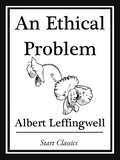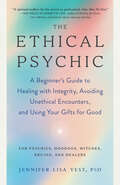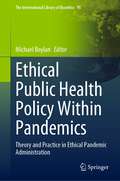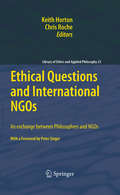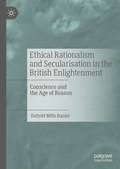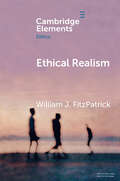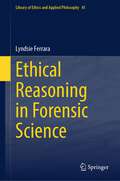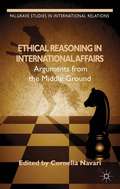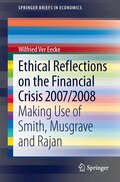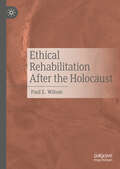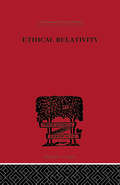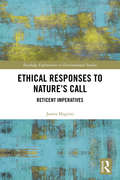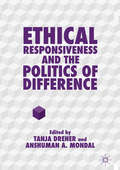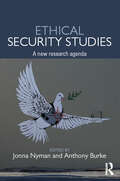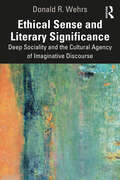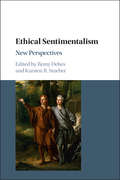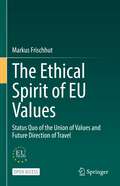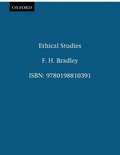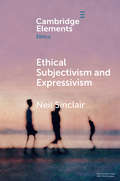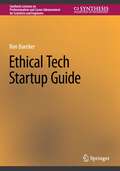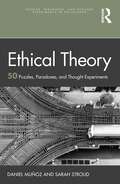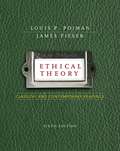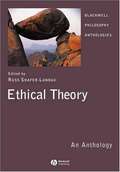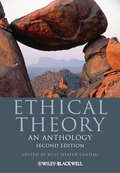- Table View
- List View
An Ethical Problem
by Albert LeffingwellWritten by physician and social reformer, Albert Leffingwell sheds light on the abusive experimentation on man and animals.
The Ethical Project
by Philip KitcherPrinciples of right and wrong guide the lives of almost all human beings, but we often see them as external to ourselves, outside our own control. In a revolutionary approach to the problems of moral philosophy, Philip Kitcher makes a provocative proposal: Instead of conceiving ethical commands as divine revelations or as the discoveries of brilliant thinkers, we should see our ethical practices as evolving over tens of thousands of years, as members of our species have worked out how to live together and prosper. Elaborating this radical new vision, Kitcher shows how the limited altruistic tendencies of our ancestors enabled a fragile social life, how our forebears learned to regulate their interactions with one another, and how human societies eventually grew into forms of previously unimaginable complexity. The most successful of the many millennia-old experiments in how to live, he contends, survive in our values today. Drawing on natural science, social science, and philosophy to develop an approach he calls "pragmatic naturalism," Kitcher reveals the power of an evolving ethics built around a few core principles-including justice and cooperation-but leaving room for a diversity of communities and modes of self-expression. Ethics emerges as a beautifully human phenomenon-permanently unfinished, collectively refined and distorted generation by generation. Our human values, Kitcher shows, can be understood not as a final system but as a project-the ethical project-in which our species has engaged for most of its history, and which has been central to who we are.
The Ethical Psychic: A Beginner's Guide to Healing with Integrity, Avoiding Unethical Encounters, and Using Your Gifts for Good
by Jennifer Lisa VestA 101 guide for psychics and energy workers to build an authentic, equitable, and culturally sensitive healing practice, written by Afro-Indigenous intuitive, scholar, and healer Dr. Jennifer Lisa Vest.Being an ethical psychic means being of service--and learning how to navigate the thorny issues and unique risks inherent to intuitive work. From knowing your boundaries and limitations--and respecting those of your clients--to resisting the temptation of the guru lifestyle, The Ethical Psychic offers 7 critical guiding principles for grounded, ethical practice. Intuitive, philosopher, and ethicist Dr. Jennifer Lisa Vest, PhD, explores why (and how) energy workers must be of service, authentic, and self-aware; learn from their mistakes; embody sensitivity to client needs; be humble; and listen to a higher source. With training in African American Hoodoo, Native American Sweatlodge, Jamaican Revivalism, Trinidadian Shango, Spiritualism, Reiki, Pranic Healing, and other traditions, Dr. Vest is uniquely positioned to address readers&’ most common and pressing questions, like: How do I avoid crossing boundaries? What if I&’m making things worse? What privacy considerations do I need to think about? How can I be financially ethical? How do I avoid appropriation? What do I need to know about working with spirits? A go-to-guide for any medium, spirit worker, psychic, or aspiring Reiki master, The Ethical Psychic helps readers become the grounded and effective healers they were born to be.
Ethical Public Health Policy Within Pandemics: Theory and Practice in Ethical Pandemic Administration (The International Library of Bioethics #95)
by Michael BoylanThis book contains original essays that look at contagious/infectious disease pandemics and the ethical public policy and administration these have entailed. In particular, the pandemics of the 1918 flu pandemic, HIV in the 1990s, SARS in 2003, Ebola from 2014–2016 and the novel COVID-19 in 2020 are highlighted. The contributions in this work offer the reader insights in these and several other recent pandemics that present differently—either via contagion or mortality rate—and how each should be addressed by countries of various sorts. This book is a must for the ongoing debate on how we should treat public health crises, such as the one we have all just encountered in the novel COVID-19 pandemic.
Ethical Questions and International NGOs
by Keith Horton Chris RocheIn recent decades there has been a great expansion in the number, size and influence of International Non-Governmental Organisations (INGOs) involved in international relief and development. These changes have led to increased scrutiny of such organisations, and this scrutiny, together with increasing reflection by INGOs themselves and their staff on their own practice, has helped to highlight a number of pressing ethical questions such organisations face, such as: should INGOs attempt to provide emergency assistance even when doing so risks helping to fuel further conflict? How should INGOs manage any differences between their values and those of the people they seek to benefit? How open and honest should INGOs be about their own uncertainties and failures? This book consists of sustained reflections on such questions. It derives from a workshop held at Melbourne University in July 2007 that brought together a group of people - for the most part, reflective practitioners and moral and political philosophers - to discuss such questions. It explores honestly some of the current challenges and dilemmas that INGOs face, and also suggests some new ideas for meeting these challenges. Our hope is that the kind of explicit reflection on the ethical issues INGOs face exemplified in this publication will help to promote a wider debate about these issues, a debate that in turn will help INGO managers and others to make better, wiser, more ethically informed decisions.
Ethical Rationalism and Secularisation in the British Enlightenment: Conscience and the Age of Reason
by Dafydd Mills DanielThis book reassesses the ethics of reason in the Age of the Reason, making use of the neglected category of conscience. Arguing that conscience was a central feature of British Enlightenment ethical rationalism, the book explores the links between Enlightenment philosophy and modern secularisation, while responding to longstanding criticisms of rational intuitionism and the analogy between mathematics and morals, derived from David Hume and Immanuel Kant. Questioning in what sense British Enlightenment ethical rationalism can be associated with a secularising ‘Enlightenment project’, Daniel investigates the extent to which contemporary, and secular liberal, invocations of reason and conscience rely on the early modern Christian metaphysics they have otherwise disregarded. The chapters cover a rich collection of subjects, ranging from the Enlightenment’s secular legacy, reason and conscience in the history of ethics, and controversies in the Scottish Enlightenment, to the role of British moralists such as John Locke, Joseph Butler and Adam Smith in the secularisation of reason and conscience. Each chapter expertly refines Enlightenment ethical rationalism by reinterpreting its most influential proponents in eighteenth-century Britain – the followers of ‘Isaac Newton’s bulldog’ Samuel Clarke – including Richard Price (Edmund Burke’s opponent over the French Revolution) and John Witherspoon (the only clergyman to sign the US declaration of Independence).
Ethical Realism (Elements in Ethics)
by William J. FitzPatrickThis Element examines the many facets of ethical realism and the issues at stake in metaethical debates about it—both between realism and non-realist alternatives, and between different versions of realism itself. Starting with a minimal core characterization of ethical realism focused on claims about meaning and truth, we go on to develop a narrower and more theoretically useful conception by adding further claims about objectivity and ontological commitment. Yet even this common understanding of ethical realism captures a surprisingly heterogeneous range of views. In fact, a strong case can be made for adding several more conditions in order to arrive at a proper paradigm of realism about ethics when understood in a non-deflationary way. We then develop this more robust realism, bringing out its distinctive take on ethical objectivity and normative authority, its unique ontological commitments, and both the support for it and some challenges it faces.
Ethical Reasoning in Forensic Science (Library of Ethics and Applied Philosophy #41)
by Lyndsie FerraraThis book explores the impact of ethical reasoning in forensic science and demonstrates that it is in fact a foundational skill required by those engaged in the field. Forensic science is viewed as a mechanism to aid the criminal justice system in finding truth, but failures within the field contribute to the growing injustice facing society. The author recognizes these failings and brings a new perspective by establishing bioethical principles as a foundation for improving ethical reasoning skills. These skills are a critical component of forensic science education for upcoming professionals. While other books focus on egregious cases of ethical misconduct, this text highlights the daily decisions and issues that occur during the forensic investigation and analysis processes. It is written for future forensic professionals and forensic science educators, as well as those individuals already working in the forensic science field.
Ethical Reasoning in International Affairs
by Cornelia NavariArguing for a middle ground between idealism and realism, this book considers the most pressing ethical and moral issues in contemporary international politics, including intervention, human rights and aid, and sets about reasoning how to resolve them in politically realistic ways.
Ethical Reflections on the Financial Crisis 2007/2008
by Wilfried Ver EeckeIn this book the author reflects on the philosophical and ethical bases of the financial crisis 2007-08 and the subsequent recession. He finds in Adam Smith solid arguments for the new free market economy, capitalism, but also arguments for a role for the government in the case of public goods (roads) and of merit goods (education, control of banking). Where the provision of public goods requires that the government respect consumer sovereignty there the provision of merit goods legitimizes the violation of that principle. By making use of the history of economic thought (e.g., the neo-liberal tradition) the author demonstrates that Musgrave's idea of merit goods can be expanded to eleven domains in which the government has an important function. He legitimizes that move by using the Kantian argument that we must accept the possibility conditions for what we want. The author demonstrates that Rajan, Reich and Reinhart & Rogoff make use of seven of his eleven categories of merit goods in order to explain the financial crisis 2007-08 and the subsequent recession. The author thereby provides a philosophical and ethical analysis of the government's failures at the basis of the financial crisis.
Ethical Rehabilitation After the Holocaust
by Paul E. WilsonGenocide murders innocents in a society, and it leaves behind moral corruption and societal twistedness. A genocide like the Holocaust can happen only if the normative ethical commitments to honor the fundamental right to life are compromised or abandoned. When a society lives through a genocide, the moral imagination of peoples and collectives, their ethical behaviors, and even the underlying social contract become twisted and broken. Societies and individuals caught within a genocide need an ethical rehabilitation to move a post-genocidal society out of its ethical degradation. This book discusses the steps of transitional justice as ethical ways to move individuals and societies away from lingering injustices and toward an equilibrium of justice.
Ethical Relativity (International Library of Philosophy)
by Edward WestermarckFirst published in 2000. Routledge is an imprint of Taylor & Francis, an informa company.
Ethical Responses to Nature’s Call: Reticent Imperatives (Routledge Explorations in Environmental Studies)
by James MagriniArguing for a renewed view of objects and nature, Ethical Responses to Nature’s Call considers how it is possible to understand our ethical duties - in the form of ethical intuitionalism - to nature and the planet by listening to and releasing ourselves over to the call or address of nature. Blending several strands of philosophical thought, such as Graham Harman’s Object-Oriented Ontology, W. D. Ross’s prima fathics, Alphonso Lingis’s phenomenological ethics traceable to The Imperative, and Michael Bonnett’s ecophilosophy, this book offers a unique rejoinder to the problems and issues that continue to haunt humans’ relationship to nature. The origins of such problems and issues largely remain obscured from view due to the oppressive influence of the "Cultural Framework" which gives form and structure to the ways we understand, discourse on, and comport ourselves in relation to the natural world. Through understanding this "Cultural Framework" we also come to know the responses we continue to offer in answer to nature’s call and address, and are then in a position to analyze and assess those responses in terms of their potential ethical weight. Such a phenomenon is made possible through the descriptive-and-interpretive method of eco-phenomenology. This renewed vision of the human-and-nature provides direction for our interaction with and behavior toward nature in such a way that the ethical insight offers a diagnosis and provides a potentially compelling prescriptive for environmental ills.
Ethical Responsiveness and the Politics of Difference
by Tanja Dreher Anshuman A. MondalThis edited collection focuses on the ethics, politics and practices of responsiveness in the context of racism, inequality, difference and controversy. The politics of difference has long been concerned with speech, voice and representation. By focusing on the practices and politics of responsiveness—listening, reading and witnessing—the volume identifies vital new possibilities for ethics and social justice. Chapters focus on the conditions of possibility, or listening as ethical praxis; unsettling or disrupting colonial relationships; and ways of listening that highlight non-Western traditions and move beyond the liberal frame. Ethical responsiveness shifts some of the responsibility for negotiating difference and more just futures from subordinated speakers, and on to the relatively more privileged and powerful.
Ethical Security Studies: A New Research Agenda (Routledge Critical Security Studies)
by Anthony Burke Jonna NymanAt a time of grave ethical failure in global security affairs, this is the first book to bring together emerging theoretical debates on ethics and ethical reasoning within security studies. In this volume, working from a diverse range of perspectives—poststructuralism, liberalism, feminism, just war, securitization, and critical theory—leading scholars in the field of security studies consider the potential for ethical visions of security, and lay the ground for a new field: "ethical security studies". These ethical ‘visions’ of security engage directly with the meaning and value of security and security practice, and consider four key questions: • Who, or what, should be secured? • What are the fundamental grounds and commitments of different security ethics? • Who or what are the most legitimate agents, providers or speakers of security? • What do ethical security practices look like? What ethical principles, arguments, or procedures, will generate and guide ethical security practices? Informed by a rich understanding of the intellectual and historical experience of security, the contributors advance innovative methodological, analytical, political and ethical arguments that represent the cutting edge of the field. This book opens a new phase of collaboration and growth that promises to have great benefits for the more humane, effective and ethical practice of security politics. This book will be of much interest to students of critical security studies, ethics, philosophy, and international relations.
Ethical Sense and Literary Significance: Deep Sociality and the Cultural Agency of Imaginative Discourse
by Donald R. WehrsThis study blends together ethical philosophy, neurocognitive-evolutionary studies, and literary theory to explore how imaginative discourse addresses a distinctively human deep sociality, and by doing so helps shape cultural and literary history. Deep sociality, arising from an improbable evolutionary history, both entwines and leaves non-reconciled what is felt to be significant for us and what ethical sense seems to call us to acknowledge as significant, independent of ourselves. Ethical Sense and Literary Significance connects literary and cultural history without reducing the literary to a mere expression of something else. It argues that affective differences between non-egocentric and egocentric registers of significance are integral to the bioculturally evolved deep sociality that verbal art addresses—often in unsettling and socially critical ways. Much imaginative discourse, in early societies as well as recent ones, brings ethical sense and literary significance together in ways that reveal their intricate but non-harmonized internal entwinement. Drawing on contemporary scholarship in the humanities and sciences, Donald R. Wehrs explores the implications of interdisciplinary approaches to topics central to a wide range of fields beyond literary studies, including neuroscience, anthropology, phenomenological philosophy, comparative history, and social psychology.
Ethical Sentimentalism: New Perspectives
by Remy Debes Stueber Karsten R.In recent years there has been a tremendous resurgence of interest in ethical sentimentalism, a moral theory first articulated during the Scottish Enlightenment. Ethical Sentimentalism promises a conception of morality that is grounded in a realistic account of human psychology, which, correspondingly, acknowledges the central place of emotion in our moral lives. However, this promise has encountered its share of philosophical difficulties. Chief among them is the question of how to square the limited scope of human motivation and psychological mechanism - so easily influenced by personal, social, and cultural circumstance - with the seeming universal scope and objective nature of moral judgment. The essays in this volume provide a comprehensive evaluation of the sentimentalist project with a particular eye to this difficulty. Each essay offers critical clarification, innovative answers to central challenges, and new directions for ethical sentimentalism in general.
The Ethical Spirit of EU Values: Status Quo of the Union of Values and Future Direction of Travel
by Markus FrischhutThis open access book, summarising the research conducted at this Jean Monnet Chair, seeks to identify the ethical spirit of European Union (EU) values. EU integration began at the economic level; human rights were only added at a later stage. Finally, the Lisbon Treaty turned the EU into a ‘Union of values’ by enshrining certain concepts in Art 2 TEU. This provision can be seen as a hub linked to various other provisions of EU primary and secondary law. The values contained therein have, amongst others, been applied to two areas (digitalisation and non-financial reporting, partly in sports), and further specified in others (health and partly in sports). This book analyses the evolution of values (ratione temporis) and the questions of who is entitled and who is obliged (ratione personae). Besides the external perspective (ratione limitis; e.g., Brexit), it focuses on the composition of the EU’s common values (ratione materiae). As Art 2 TEU can be viewed as a hub, it is essential to focus on various relations, not only between values, but also between values and other provisions of EU law, as well as other concepts. Based on this description of the status quo, the book subsequently addresses a possible future direction, arguing for an additional narrative (trust), an additional value (environmental protection), and a more communitarian Union. In closing, apart from the classical commitment of the EU and the Member States to uphold the values of the EU, the book discusses the level of individuals and values as virtues. Various figures and tables complement this overview of the status quo of the Union of values and outline of its future direction.
Ethical Studies (Second Edition)
by F. H. BradleyBritish Idealist F. H. Bradley (1846-1924) was one of the most distinguished and influential philosophers of his time. He made contributions to metaphysics, moral philosophy and the philosophy of logic. The author of Appearance and Reality (1893), a classic in metaphysics (also reissued in this series), he rejected pluralism and realism. In this polemic, first published in 1876, Bradley argues against the dominant ethical theories of his time. Essays in this book entitled 'Pleasure for Pleasure's Sake' and 'Duty for Duty's Sake' examine and criticise hedonistic utilitarianism and Kantian ethics respectively. Bradley disagreed with individualism, and in 'My Station and its Duties' he discusses the idea that self-realisation can only be found as part of the social organism. This is a classic ethical work that will be valuable both to those studying the ethical theories discussed, and to those interested in the history of philosophy.
Ethical Subjectivism and Expressivism (Elements in Ethics)
by Neil SinclairEthical subjectivists hold that moral judgements are descriptions of our attitudes. Expressivists hold that they are expressions of our attitudes. These views cook with the same ingredients – the natural world, and our reactions to it – and have similar attractions. This Element assesses each of them by considering whether they can accommodate three central features of moral practice: the practicality of moral judgements, the phenomenon of moral disagreement, and the mind-independence of some moral truths. In the process, several different versions of subjectivism are distinguished (simple, communal, idealising, and normative) and key expressivist notions such as 'moral attitudes' and 'expression' are examined. Different meanings of 'subjective' and 'relative' are examined and it is considered whether subjectivism and expressivism make ethics 'subjective' or 'relative' in each of these senses.
Ethical Tech Startup Guide (Synthesis Lectures on Professionalism and Career Advancement for Scientists and Engineers)
by Ron BaeckerThis book draws on almost five decades of entrepreneurial experience and innovation and offers a broad perspective on ethical tech startups. It approaches the subject on two fronts by considering both the business of ethical technology as well as the challenges of tech startups with an imperative to behave ethically. The book provides readers with the tools to ethically frame and construct their startup ventures whether or not their core business is rooted in a technology meant to serve a social good. Incorporating ethical business practices both in knowledge and action, this book leads readers through the process of shaping an incipient startup idea all the way through the long-term operating stages. Using real-world case studies, the book explores key factors in successfully planning, framing, launching, leading, managing, and financing startups. This book is essential reading for researchers, academics, and students as well as industry professionals who have an idea or technology they want to get out into the world. Whether readers are seasoned in the field, employees of existing startups looking for better approaches, or new idealistic innovators who want to learn where to start, this guidebook explains and explores the road to launching the next great ethical tech startup.
Ethical Theory: 50 Puzzles, Paradoxes, and Thought Experiments (Puzzles, Paradoxes, and Thought Experiments in Philosophy)
by Daniel Muñoz Sarah StroudIn this new kind of introduction to ethical theory, Daniel Muñoz and Sarah Stroud present 50 of the field’s most exciting puzzles, paradoxes, and thought experiments. Over the course of 11 chapters, the authors cover a huge variety of topics, starting with the classic debate between utilitarians and deontologists and ending on existential questions about the future of humanity.Every chapter begins with a helpful introduction, and each of the 50 entries includes references for further reading and questions for reflection. Among the entries are such classics as the Ring of Gyges, Jim and the Villagers, the Repugnant Conclusion, JoJo, “One Thought Too Many,” the Miners Puzzle, the Gentle Murder Paradox, Nowheresville, the Experience Machine, and the Trolley Problem. The book also explores several more recent topics of interest, such as doxastic wronging and the ethics of AI, so that even advanced students are likely to discover something new. Each entry can be read on its own, and the writing is accessible and conversational throughout, making this an ideal resource for undergraduate teaching. Readers at any level can pick up this book and see for themselves how fascinating—and puzzling—ethical theory can be.Key Features: Offers 50 puzzles, paradoxes, and thought experiments, with every entry including the following elements: Presentation of the case Discussion of responses to and implications of the case A reading list which cites the classic presentation of the case and recommends several other treatments or responses Questions for reflection Coverage of each of the 50 is self-contained, allowing students to quickly understand an issue and giving instructors flexibility in assigning readings to match the themes of the course. Additional pedagogical features include a general volume introduction as well as smaller introductions to each of the 11 larger, topic-oriented chapters.
Ethical Theory: Classical and Contemporary Readings
by Louis P. PojmanThis authoritative and reader-friendly anthology will help you think through some of humanity's most persistent questions regarding right and wrong, good and bad. ETHICAL THEORY: CLASSICAL AND CONTEMPORARY READINGS cuts through the confusion and delivers a clear and comprehensive selection of readings from classical and contemporary sources. Presented in a dynamic pro and con format, with detailed summaries of each argument, this comprehensive anthology allows you to watch the ethical debate unfold before your eyes.
Ethical Theory: An Anthology
by Russ Shafer-LandauEthical Theory: An Anthology is an authoritative collection of key essays by top scholars in the field, addressing core issues including consequentialism, deontology, and virtue ethics, as well as traditionally underrepresented topics such as moral knowledge and moral responsibility. <P> Brings together seventy-six classic and contemporary pieces by renowned philosophers, from classic writing by Hume and Kant to contemporary writing by Derek Parfit, Susan Wolf, and Judith Jarvis Thomson. This book guides students through key areas in the field, among them consequentialism, deontology, contractarianism, and virtue ethics. This book also includes coverage of metaethics, normative ethics, and practical ethics Reaches beyond traditional texts by also including important, but usually underrepresented, topics such as moral knowledge, moral standing, moral responsibility, and ethical particularism.<P> Page numbers included.
Ethical Theory
by Russ Shafer-LandauThe second edition of Ethical Theory: An Anthology features a comprehensive collection of more than 80 essays from classic and contemporary philosophers that address questions at the heart of moral philosophy.Brings together 82 classic and contemporary pieces by renowned philosophers, from seminal works by Hume and Kant to contemporary views by Derek Parfit, Susan Wolf, Judith Jarvis Thomson, and many more Features updates and the inclusion of a new section on feminist ethics, along with a general introduction and section introductions by Russ Shafer-LandauGuides readers through key areas in ethical theory including consequentialism, deontology, contractarianism, and virtue ethics Includes underrepresented topics such as moral knowledge, moral standing, moralresponsibility, and ethical particularism
